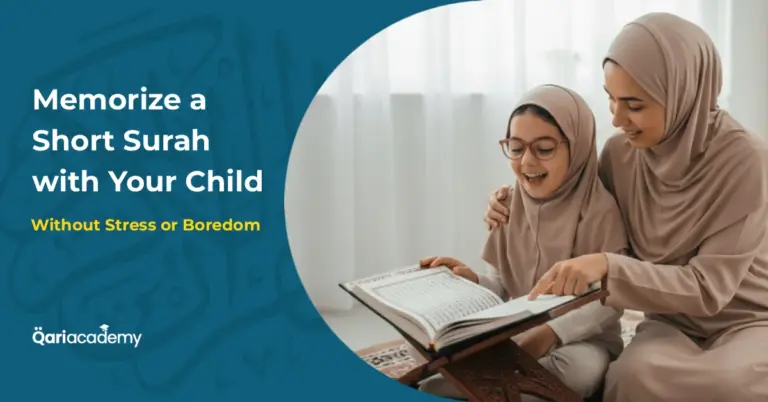
Introduction
Many parents wonder: “When should I start Quran memorization with my child?” Starting early can make a significant difference in retention, pronunciation, and love for the Quran. Studies show that children have heightened memory capacity and attention spans at a young age, making early years ideal for introducing Quranic learning. This guide will explore practical tips and strategies to start Quran memorization early with your child, ensuring lessons are enjoyable, consistent, and effective.
1. Understand the Benefits of Early Quran Learning
Starting early has multiple advantages:
- Children develop better pronunciation and Tajweed skills.
- Early exposure builds familiarity with Arabic letters and sounds.
- Positive experiences at a young age encourage lifelong love for Quran learning.
Tip: Use gentle, playful methods to create a positive association with the Quran from the start.
2. Create a Routine from the Beginning
Consistency is essential for young learners:
- Set a fixed time each day for memorization and review.
- Begin with short sessions, gradually increasing duration as attention span grows.
- Link Quran time with daily prayers to reinforce routine.
Example: A 5–10 minute session after Fajr or before bedtime can be highly effective for toddlers.
3. Start with Simple Verses
Begin with short surahs or familiar verses:
- Focus on Al-Fatihah, Al-Ikhlas, Al-Falaq, and An-Nas.
- Break verses into smaller words or phrases for easier memorization.
- Repeat daily to build confidence and accuracy.
Tip: Early success motivates children to continue and gradually memorize longer surahs.
4. Use Interactive Learning Tools
Young children learn best through play and interaction:
- Flashcards with colorful Arabic letters.
- Audio recordings of correct recitation for imitation.
- Interactive apps that reward progress and consistency.
- Mobile apps for memorization such as MuslimPal or MuslimPro
Example: A “verse matching game” where children pair words with meanings reinforces learning through play.
5. Incorporate Positive Reinforcement
Praise and encouragement build confidence and motivation:
- Celebrate completed verses with verbal praise or small rewards.
- Use sticker charts or visual trackers to show progress.
- Emphasize effort and consistency rather than perfection.
Tip: Positive reinforcement creates a supportive environment that makes learning enjoyable.
6. Encourage Listening and Recitation
Auditory learning enhances memorization:
- Encourage children to listen to Quran recitation daily.
- Repeat verses together to reinforce memory and pronunciation.
- Teach children to recite aloud, even in small segments.
Example: Play audio recitation during playtime or car rides to familiarize children with correct pronunciation.
7. Make Review Part of Daily Life
Regular review prevents forgetting and strengthens retention:
- Integrate short review sessions into daily routines.
- Alternate between newly memorized verses and older ones.
- Make review interactive with questions or games.
Tip: Children retain more when review sessions are consistent and enjoyable.
8. Use Storytelling and Context
Understanding the meaning behind verses improves connection:
- Explain translations in simple, age-appropriate language.
- Share stories behind surahs or verses to make learning relatable.
- Encourage children to reflect on lessons and applications.
Example: Explaining the story of the Prophet’s patience alongside relevant verses makes the lesson memorable and meaningful.
9. Involve Family Members
Family support enhances engagement and accountability:
- Practice memorization together with siblings or parents.
- Encourage reciting to grandparents or family members.
- Make family Quran sessions a fun, shared activity.
Tip: Shared learning builds motivation, confidence, and enjoyment.
10. Be Patient and Flexible
Young children learn at different paces, so patience is key:
- Adjust session length and expectations according to attention span.
- Allow breaks or pauses if the child becomes distracted.
- Avoid pressure; focus on building positive habits and love for the Quran.
Tip: A calm, supportive approach ensures children remain motivated and confident.
Why Early Quran Learning Works
Starting Quran memorization early provides children with cognitive, linguistic, and spiritual benefits. Structured routines, interactive tools, consistent review, family involvement, and positive reinforcement create a holistic environment that nurtures learning. Children develop confidence, accurate pronunciation, and long-term retention while enjoying their journey with the Quran.
At QariAcademy, our tutors specialize in early Quran learning, combining interactive lessons, personalized guidance, and engaging activities. Children receive support tailored to their age and abilities, making Quran memorization a joyful and effective experience.
Do you want to start Quran memorization early with your child and build strong, lasting habits? Book a free trial at QariAcademy today and let our expert tutors guide your child toward confident, joyful, and effective Quran learning!






